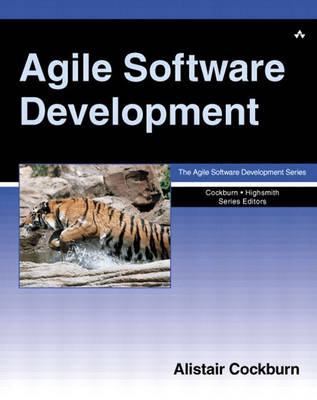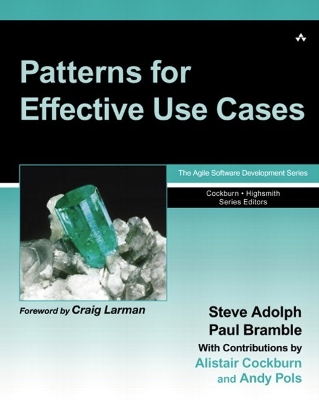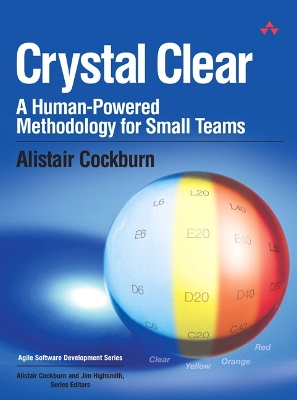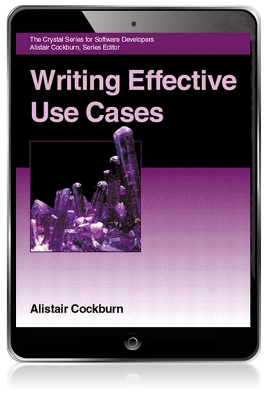Agile Software Development
4 total works
"Coming of age for software developers means understanding that software is a cooperative effort, not something individuals do in isolation. This is a book that teams of software developers can thrive upon, full of sensible advice for a cooperative development approach."
--Tom DeMarco, The Atlantic Systems Guild
Software development paradigms are shifting. The development group's "team" ability, and the effects of the individual developer, become more important as organizations recognize that the traditional approach of increasing process pressure and overworking team members is not meeting getting the job done. The pioneers of Agile methodologies question the preconceived processes within which development teams work. Rather than adding to the burden of the individual developer, Agile asks "how can we change the process so that the team is more productive, while also improving quality?" The answer is in learning to play the "game."
Written for developers and project managers, Agile Software Development compares software development to a game. Team members play the game knowing that the ultimate goal is to win--always remembering what they have learned along the way, and always keeping in mind that they will never play the same way twice. Players must keep an open mind to different methodologies, and focus on the goal of developing quality software in a short cycle time.
Based on a decade's work and research, and interviews with software project teams, this book presents sound advice for bringing difficult projects to successful conclusion with a minimum of stress. It includes advice on:
- The principals behind agile methodologies
- Which methodologies fit different projects--including appendixes to select the appropriate methodology on a project
- New vocabulary for describing methodologies
- Just-in-time methodology tuning
- Managing the incompleteness of communication
- Continuous methodology reinvention
- The manifesto for agile software development
Today's software developers need to recognize that they have a number of methodologies to choose from. With this book as a guide, they can break free of nonproductive habits, move beyond old routines, and clear a new path to success.
0201699699B09142001
Patterns for Effective Use Cases
by Steve Adolph, Paul Bramble, Alistair Cockburn, and Andy Pols
This book introduces Crystal Clear, a better lightweight methodology forbuilding software. It describes the roles, teams, values, intentions, habits,activities, policies and work products of a small software development team forwhom time-to-market and development costs are critical considerations.Alistair Cockburn is one of the founders of the Agile software developmentmovement. He spells out proven best practices based on his extensiveexperience helping organizations build software quickly and with less cost. Theauthor understands that small teams cannot be burdened by "process-heavy"software methodologies. By advocating that developers stay close together andremain in steady, good-will communication with customers and users, thisbook teaches the reader how to develop software that not only does what it issupposed to do, but also gets completed on time and within budget.
Writing use cases as a means of capturing the behavioral requirements of software systems and business processes is a practice that is quickly gaining popularity. Use cases provide a beneficial means of project planning because they clearly show how people will ultimately use the system being designed. On the surface, use cases appear to be a straightforward and simple concept. Faced with the task of writing a set of use cases, however, practitioners must ask: "How exactly am I supposed to write use cases?" Because use cases are essentially prose essays, this question is not easily answered, and as a result, the task can become formidable.
In Writing Effective Use Cases, object technology expert Alistair Cockburn presents an up-to-date, practical guide to use case writing. The author borrows from his extensive experience in this realm, and expands on the classic treatments of use cases to provide software developers with a "nuts-and-bolts" tutorial for writing use cases. The book thoroughly covers introductory, intermediate, and advanced concepts, and is, therefore, appropriate for all knowledge levels. Illustrative writing examples of both good and bad use cases reinforce the author's instructions. In addition, the book contains helpful learning exercises--with answers--to illuminate the most important points.
Highlights of the book include:
- A thorough discussion of the key elements of use cases--actors, stakeholders, design scope, scenarios, and more
- A use case style guide with action steps and suggested formats
- An extensive list of time-saving use case writing tips
- A helpful presentation of use case templates, with commentary on when and where they should be employed
- A proven methodology for taking advantage of use cases
With this book as your guide, you will learn the essential elements of use case writing, improve your use case writing skills, and be well on your way to employing use cases effectively for your next development project.



